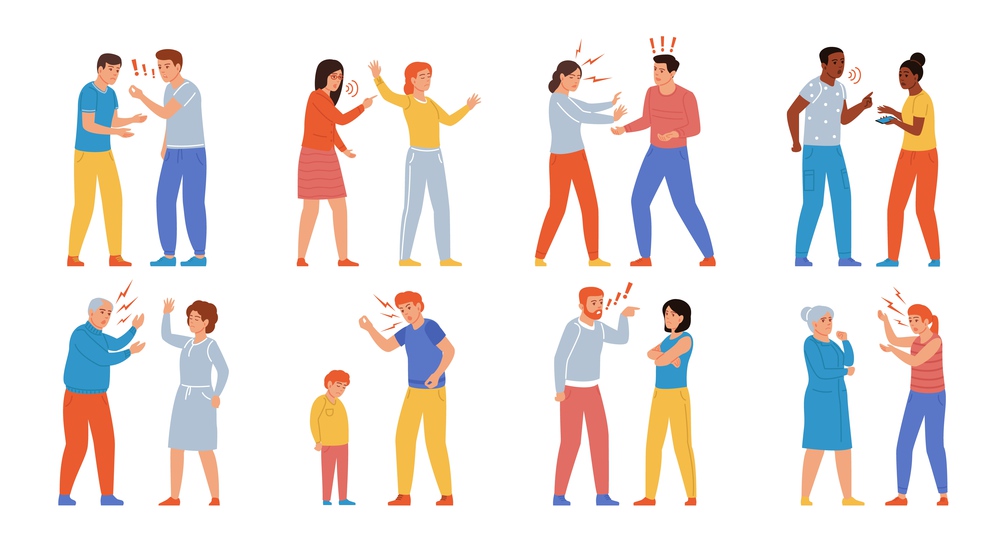Dealing with Family Conflict and Family Rupture

The reality is that many more people than you might think are dealing with family conflict. If family conflict is a reality you’re facing in your life, you are far from unique.

What does it mean for our personal journey when we’re dealing with family conflict? The answer to that question can vary immensely. It depends on the type of conflict involved, the personalities of the individuals in conflict, and the nature of the family system. One thing that we know for certain is that individuals often deny or downplay the impact that conflict with family members has on their lives.
There are aspects of family conflict that properly belong in the realm of couples’ therapists or family therapists. Yet there is also real importance in looking closely at the impact on the individual who finds her- or himself dealing with family conflict. What is the impact on us personally and individually of dealing with conflict within our families? How does it affect the individual psyche? Is it part of a major life transition? What gets stirred up in the unconscious?
Clearly, family conflict is a matter of importance at all times and seasons. However, the pandemic has brought home the reality of dealing with family conflict in a way that is unprecedented. Long bouts of lockdown have led to tensions in families. Many have had the experience of deep rifts in families resulting from differing attitudes and values around COVID.
It is now clear to me that the family is a microcosm of the world. To understand the world, we can study the family: issues such as power, intimacy, autonomy, trust, and communication skills are vital parts underlying how we live in the world.
The greatest tragedy of the family is the unlived lives of the parents.
When We’re Dealing with Family Conflict
Needless to say, dealing with family conflict can have a huge psychological effect on people. We expect that conflict will have an enormous effect on the emotional security of children. However, what may be less apparent is the impact on the sense of security and well-being of adults. Certainly, conflicts between parents and children, between spouses, between siblings of any age, and all other forms of family conflict impact us in profound ways.
So, here are some of the most common examples of family conflict:
- Issues over finances and jobs;
- Issues related to in-laws;
- Issues related to marital fidelity;
- Conflict over family events;
- Sibling conflict over care of an elderly parent;
- Divorced parents in conflict over care of a child; and,
- Conflicting political or social values within a family or extended family
These are only some of a large number of possible sources of conflict.
The Unconscious Aspects of Dealing with Family Conflict
When it comes to family conflict, we may be dealing with an “iceberg” situation. We may be consciously aware of feelings, attitudes and emotional responses engendered by conflict. Yet there may be a great deal of unacknowledged and/or unconscious material below the surface in the unconscious. It may be essential to try and make this material conscious, and to come to terms with as much of it as we can.
For instance, we may be carrying long-held unconscious resentments. Or, there may be repressed parts of ourselves that we could never bring forward into the family. Then again, there may be parts of our shadow bearing emotions or attitudes that are not even acceptable to ourselves, let alone to the family. These various factors may be linked to experiences of depression and anxiety. If we are to find any kind of healing or any sense of integrity around family conflict, we may need to explore such psychic contents.
Journeying Towards Wholeness and Healing
When an individual is cast into the depths of family conflict, it can be profoundly disorienting. It may be essential to seek healing and to discover ways to make meaning of what has occurred. As I write this, I’m thinking of clients who have experienced conflict with spouses and parents over the last two years. In many cases, this has been extremely painful, and has left individuals feeling that they have lost their bearings. As a result, they have a strong sense of wanting to recover their compass.
When dealing with family conflict, it can be of tremendous benefit to rely on the support of a relationship with a Jungian psychoanalyst, who can help in processing all the aspects of the conflict.
With every good wish for your personal journey,
© 2022 Brian Collinson, 2238 Constance Drive Oakville, Ontario (near Mississauga)
